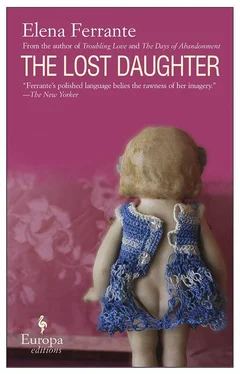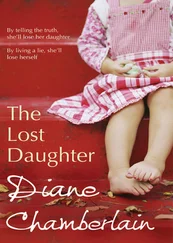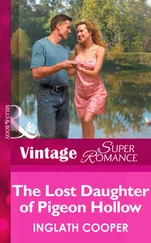“You’ve got your color back, you had turned quite pale.”
“Sometimes the sea makes me tired.”
Giovanni got up, said hesitantly, indicating the terrace:
“If you don’t mind, I’ll smoke a cigarette.”
He went out, lighted a cigarette. I joined him.
“Is it yours?” he asked, pointing to the doll, but like one who wants to say something witty to make himself important.
I nodded yes.
“Her name is Mina, she’s my good-luck charm.”
He took the doll by the chest, but he was disconcerted, put her down.
“There’s water inside.”
I said nothing, I didn’t know what to say.
He looked at me circumspectly, as if something about me, for a moment, had alarmed him.
“Did you hear,” he asked me, “about that poor child whose doll was stolen?”
I made myself study, and continued for much of the night. Starting in early adolescence I learned to be extremely disciplined: I chase thoughts out of my head, put pain and humiliation to sleep, push anxieties into a corner.
I stopped around four in the morning. The pain in my back had returned, where the pinecone had hit me. I slept until nine and had breakfast on the terrace, opposite the sea that trembled in the wind. Nani had remained outside, sitting on the table, and her dress was damp. For a fraction of a second it seemed to me that she moved her lips and stuck out the red tip of her tongue, as if playing a game.
I had no desire to go to the beach, I didn’t even want to leave the house. It bothered me to have to pass the bar and see Giovanni chatting with his friends, and yet I felt it was urgent to resolve the matter of the doll. I looked at Nani sadly, caressed her cheek. My unhappiness at losing her had not diminished, in fact it had increased. I was confused; at moments it seemed to me that Elena could do without her, while I could not. On the other hand I had been careless, I had let Giovanni come in without hiding her. I thought for the first time of cutting short my vacation, leaving today, tomorrow. Then I laughed at myself, where was I letting myself go, I was planning to flee as if I had stolen a child and not a doll. I cleaned up, washed, made myself up carefully. I put on a nice dress and went out.
There was a fair going on in the town. The square, the main avenue, the streets and side streets, closed to cars, were a labyrinth of stalls, while the traffic on the edges of town was choked as if it were a city. I mingled with a crowd of mainly women who were rummaging through a huge variety of goods—dresses, jackets, coats, raincoats, hats, scarves, trinkets, household objects of every kind, real or fake antiques, plants, cheeses and salamis, vegetables, fruit, crude marine paintings, miraculous bottles from herbalists. I like fairs, especially the stalls that sell old clothes and the ones with modern antiques. I buy everything, old dresses, shirts, pants, earrings, pins, knickknacks. I stopped to dig among the jumble, a crystal paperweight, an old iron, opera glasses, a metal sea horse, a Neapolitan coffeepot. I was examining a hatpin with a shiny point, dangerously long and sharp, and a beautiful handle of black amber, when my cell phone rang. My daughters, I thought, even if it was an unlikely time. I looked at the display, which showed the name of neither one but a number I seemed to recognize. I answered.
“Signora Leda?”
“Yes.”
“I’m the mother of the child who lost the doll, the one that . . .”
I was surprised, I felt anxiety and pleasure, my heart began to race.
“Hello, Nina.”
“I wanted to see if this was your number.”
“It’s mine, yes.”
“I saw you yesterday, in the pines.”
“I saw you, too.”
“I’d like to speak to you.”
“All right, tell me when.”
“Now.”
“Now I’m in town, at the fair.”
“I know, I’ve been following you for ten minutes. But I keep losing you, it’s so crowded.”
“I’m near the fountain. There’s a stall selling old trinkets, I won’t move from here.”
I pressed my chest, to slow my racing heart. I fingered objects, examined some, but mechanically, without interest. Nina appeared in the crowd, she was pushing Elena in the stroller. Every so often she held on with one hand to the big hat that her husband had given her to keep it from being carried away by the wind from the sea.
“Hello,” I said to the child, who had a tired look and the pacifier in her mouth. “Is the fever gone?”
Nina answered for her daughter:
“She’s fine, but she won’t get over it, she wants her doll.”
Elena took the pacifier out of her mouth, and said:
“She has to take her medicine.”
“Is Nani sick?”
“She has a baby in her stomach.”
I looked at her uncertainly.
“Is her baby sick?”
Nina interrupted with some embarrassment, laughing:
“It’s a game. My sister-in-law takes pills and she pretends to give them to the doll, too.”
“So Nani is pregnant, too?”
Nina said: “She decided that the aunt and the doll are both expecting a baby. Right, Elena?”
The hat flew off, I picked it up for her. Her hair was pulled up, her face looked more beautiful.
“Thank you, with the wind it won’t stay on.”
“Wait,” I said.
I arranged the hat carefully and used the long pin with the amber handle to fix it in her hair.
“There, it won’t fall off. But be careful for the child, disinfect it when you get home, you could easily get a bad scratch.”
I asked the man at the stall how much it cost, Nina wanted to pay, I objected.
“It’s nothing.”
After that she relaxed a little. She complained of the fatigue of recent days, the child had been impossible.
“Come, sweetheart, let’s put that pacifier away,” she said, “let’s not make a bad impression on Leda.”
She spoke of her daughter with agitation. She said that ever since Elena had lost the doll she had regressed, she wanted to be either carried or pushed in the stroller, and had even gone back to the pacifier. She looked around, as if searching for a more tranquil spot, and pushed the stroller toward the gardens. She said with a sigh that she was really tired, and she stressed “tired,” she wanted me to hear it as not only physical tiredness. Suddenly she burst out laughing, but I understood that she wasn’t laughing in fun, there was a bad feeling about it.
“I know you saw me with Gino, but you mustn’t think badly of me.”
“I don’t think badly of anything or anyone.”
“Yes, that’s obvious. As soon as I saw you, I said to myself: I would like to be like that lady.”
“What is it about me in particular?”
“You’re beautiful, you’re refined, it’s clear that you know a great many things.”
“I don’t really know anything.”
She shook her head energetically.
“You have such self-confidence, you’re not afraid of anything. I saw it the moment you arrived on the beach for the first time. I looked at you and hoped that you would look in my direction, but you never did.”
We wandered a little on the garden paths, and she spoke again of the pinewood, of Gino.
“What you saw has no meaning.”
“Now, don’t tell lies.”
“It’s true, I hold him off, and I keep my lips closed. I just want to be a girl again, a little, but pretending.”
“How old were you when Elena was born?”
“Nineteen, Elena is almost three.”
“Maybe you became a mother too soon.”
She shook her head no, insistently.
“I’m happy with Elena, I’m happy with everything. It’s just lately, because of these days. If I find the person who is making my child suffer . . .”
Читать дальше












